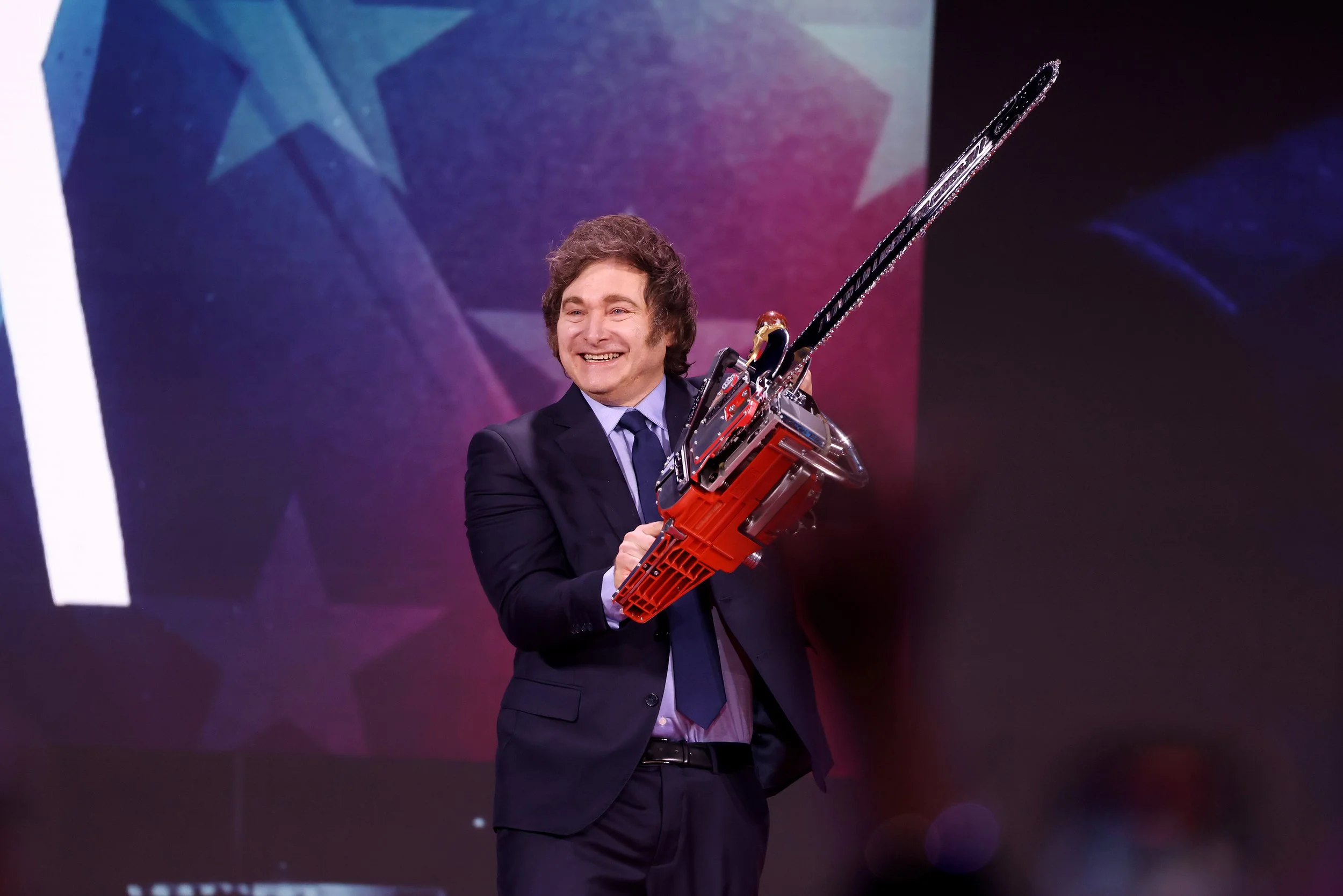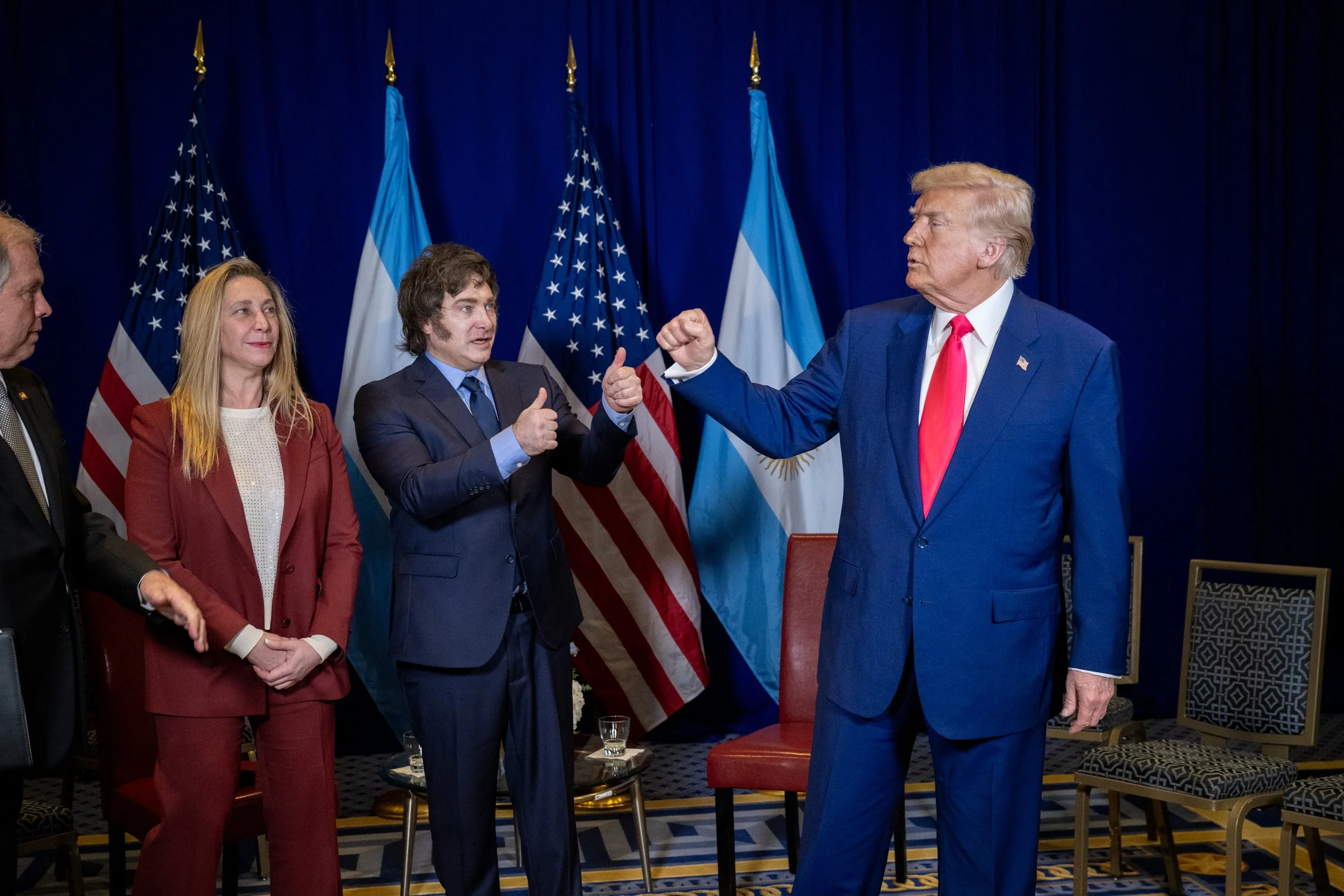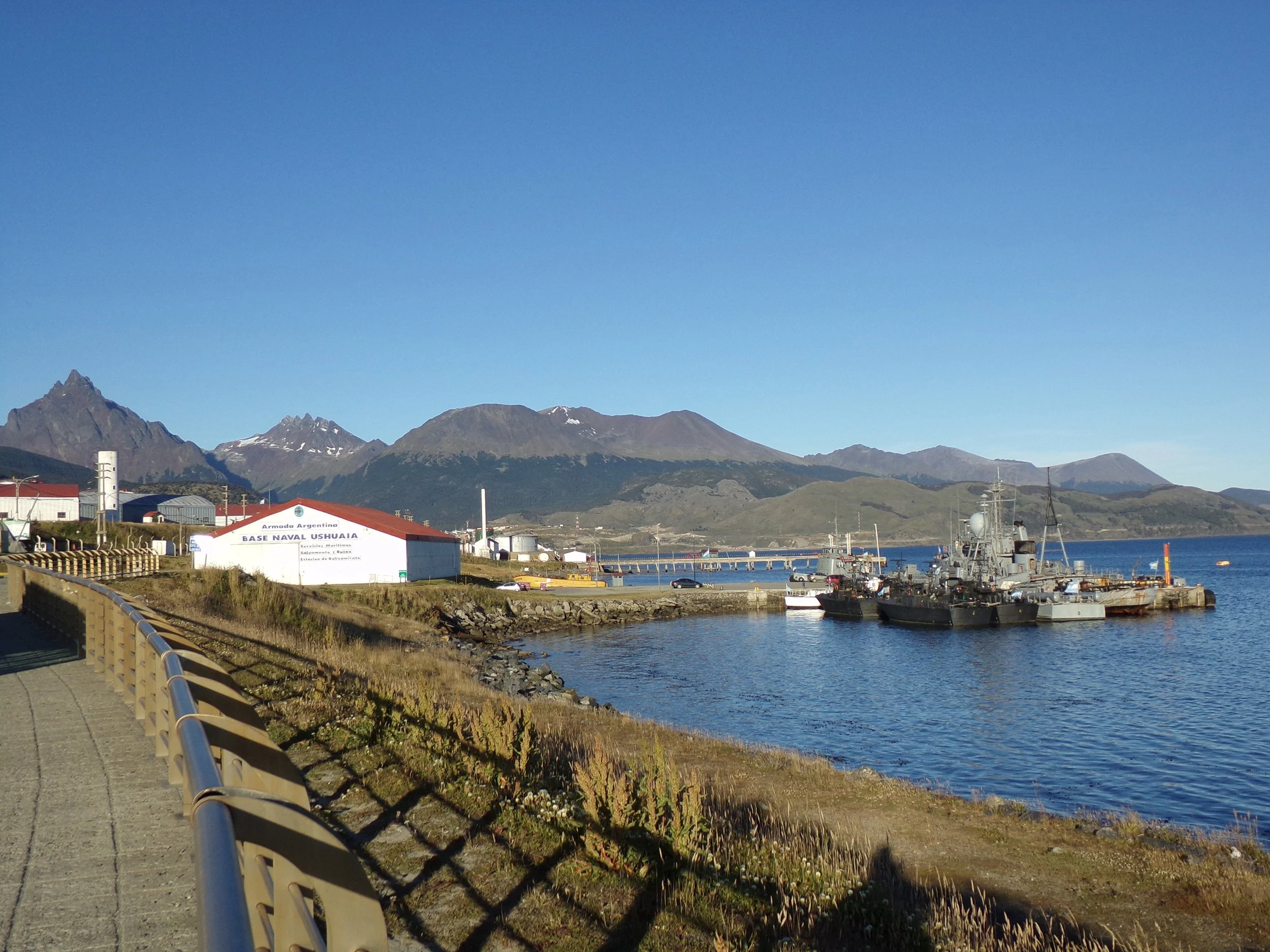Milei and Trump: Romance or Self-Interest?
President Trump meets with Argentina’s President Javier Milei at the Conservative Political Action Conference (CPAC) on February 22, 2025, in Oxon Hill, Md. Photo courtesy of the White House
A friendship of conviction or convenience? The keys to a relationship that redefines the alliance between Argentina and the United States.
Haga clic aquí para leer este reportaje en español.
What can President Donald Trump gain from his Argentine counterpart Javier Milei? What can Milei gain from Trump? Is this close relationship, for some, "unprecedented" in the history of both countries, based solely on their shared anti-woke struggle, their styles, and their perspectives on institutions? Or are there underlying strategic elements to their relationship? What do they have in common?
“Argentina has never had so much support from a U.S. government; never,” said Buenos Aires-based political analyst Sergio Berensztein, president of International Press Service.
Berensztein also mentioned U.S. Treasury Secretary Scott Bessent's trip to Argentina in April to meet with Milei to offer the Trump administration's support for “Argentina's bold economic reforms,” according to a statement from the U.S. Treasury Department.
Michael Shifter is the former president of the Washington, D.C.-based think tank Inter-American Dialogue, which focuses on issues in the Western Hemisphere. Shifter told palabra that Milei and Trump share several characteristics. “They both love showmanship and performance, and they don't believe in rules, norms, or institutions. There are quite a few differences, of course, and the United States is not Argentina, but the similarities are notable,” he added.
President Javier Milei with a chainsaw as he arrives at the Conservative Political Action Conference (CPAC), Feb. 20, 2025, in Oxon Hill, Md. Photo by Gage Skidmore, via Flickr
Shifter pointed out another similarity between Trump and Milei: their views on the rule of law. “Because neither Trump nor Milei believes in the rule of law or democratic institutions, and because both leaders are very combative and polarizing, there is a risk of authoritarianism in the United States as well as in Argentina. It seems to me that an atmosphere of fear is developing in both countries.” Shifter specified that Argentina has what he called an advantage: “Having experienced a very painful period, with enormous and tragic costs, in the late 1970s. In the United States, on the other hand, all of this is new. There are no national models, there is no memory.”
Berensztein adds that there is no risk of democratic regression in Argentina, but he highlighted similarities he believes exist between the two. “The most important thing is Milei's identification with Trump as one of the leaders in the anti-woke struggle, in this kind of cultural battle against progressive or socialist ideas.”
This, although Milei has “an ideological confusion,” Berenzstein believes, because he lumps European social democracy and Latin American authoritarianism into the same category. “He (Milei) has a kind of identification (with Trump) with an agenda of conservative values: family, property, individual freedom; things like that, almost 19th century in some ways, but which for Milei are very important in his entire thinking.”
They also have a leadership style similar to an “imperial presidency,” he added. “Trump is a president who wants to change the country from the top down, from the executive office. So does Milei.”
Argentina's President Javier Milei embraces a leadership style reminiscent of President Trump, with both attempting to reshape their nations from the executive office. Photo courtesy of the White House
Differences
Both Trump and Milei place a significant emphasis on economic issues in their administrations, but it's precisely in the economic sphere where they differ most. Trump has elements of the Latin American caudillo (strongman), as journalist Paola Ramos notes in her book, Defectors: The Rise of the Latino Far Right and What It Means for America. Trump has also implemented economic measures similar to former Argentine President Juan Perón: Perón declared his country's economic independence in 1947, as Trump has said; Perón pursued an import substitution model similar to Trump's tariff policy; Perón implemented industrial protectionism like Trump. Milei, on the other hand, is manifestly opposed to so-called Peronism.
Shifter believes that, unlike Trump, “Milei is an ideologue.”
“Like it or not, he has a firm and consistent approach to the economy. Trump is more opportunistic, similar to (El Salvador's President Nayib) Bukele, who seeks to accumulate power and wealth by any means necessary.” He added that in their economic policies, Trump and Milei are quite opposite. “Milei is more in line with the traditional Republican Party, in the tradition of (Ronald) Reagan or (George) Bush, which now almost no longer exists. And Trump is implementing economic policies that the Peronists did for many years, beginning with Perón, which created the conditions that explain Milei's emergence and election in 2023.”
Support the voices of independent journalists.
|
Berensztein, however, points out a nuance he considers important in the economic policies of Trump and Perón: Trump is doing it motivated by other factors. “The most important is his strategic competition with China. Moreover, Trump is doing this to revitalize an industry that existed, that was very important, and that, with globalization, went elsewhere. It's a return; it's a reindustrialization, not an industrialization.” Furthermore, he added, there is no “advocate of statism in Trump as there was in Perón.”
Regarding the current differences in economic policies between the U.S. and Argentine governments, Berensztein said Milei is “focused and very committed” to advancing macroeconomic stability. “It's nothing like Trump, in that sense, who spends heavily, attacks the chairman of the Federal Reserve, and is very much about eroding institutions. Milei is not.”
Argentine President Javier Milei speaking at the World Economic Forum in Davos, Switzerland, on January 23, 2025, urged the world to "embrace the last proven thesis of economic and social success" and the "ideas of freedom," advocating a return to libertarianism. Photo by Gabriel Lado/World Economic Forum
What one expects from the other
“It’s unclear what Milei expects from his relationship with Trump,” Shifter offered. There may be political and symbolic benefits, he added, such as helping to secure the $20 billion support from the International Monetary Fund that the IMF announced in April. But Shifter doubts there will be more substantive economic benefits in the future, such as a Free Trade Agreement that the Argentine government is seeking. “Free trade may be fashionable in Argentina, but not in the United States. In my country, protectionism is quite strong today, in both political parties.”
What is clear to Shifter is that there are surely interests on Trump's part. “You have to take into account that this is a relationship with Trump; he only has one question: What can they do for him? Specifically, what can Milei do for Trump? It's not clear.”
Berensztein added that Argentina “has strong ties with the Pentagon,” and recalled cooperative measures such as the sale of F-16 aircraft to Argentina to modernize the Argentine Air Force. “Negotiations have been going on for two decades,” he said. “They're talking about other cooperation in arms and military training. Cooperation also with drones for the border (with Bolivia and Paraguay). There are many contacts in key areas” between the two countries.
Berensztein mentioned that the support for the Argentine government is because Trump and Milei have a joint work agenda, which includes strategic agreements. “The most important thing is the South Atlantic,” and then the issue of "rare earths and strategic minerals.”
“Argentina is going to cede (to the United States) an area in Ushuaia, in Tierra del Fuego, so that the Americans have a logistical location to control, above all, the presence of China, Russia, Iran, and other powers in the South Atlantic. Antarctica plays a fundamental role there,” Berensztein added. “They're all trying to get whatever they can from Antarctica: minerals, energy, whatever. So the South Atlantic has become a hot zone now, something it never was.”
Furthermore, tensions in the Panama Canal are making this area more commercially important, especially for China.
A naval base in Ushuaia, Argentina, which serves as a strategic port for Argentina's navy and Antarctic operations. Photo by Gastón Cuello, via Wikimedia Commons
Regarding the timing and method of this transfer of the Ushuaia area, Berensztein said it is very ambiguous and classified, but that the new head of the U.S. Southern Command, Admiral Alvin Holsey, traveled to Argentina in early May, including a visit to the naval base in Ushuaia. Holsey went to meet “with local military personnel to learn about their missions and the key role they play in protecting maritime routes vital to global trade,” says a statement from the U.S. embassy in Buenos Aires.
Berensztein asserted that Argentina has an "enormous opportunity" now that, after a long tradition of cooperation between the United States and Brazil, the Brazilian government of Luiz Inácio Lula da Silva is moving closer to Vladimir Putin, mentioning a military parade in Moscow that Lula da Silva attended in May. Furthermore, Berensztein added, Colombia was a competitor with Argentina in its relationship with the United States until the government of President Gustavo Petro. “Petro suspended Plan Colombia, which means that, even in terms of cooperation in the fight against drug trafficking, the United States has no other ally other than Argentina.”
—
Ana Lissardy is a Uruguayan author, poet, journalist, and editor. She has a degree in Literature and a master’s in Cinema, and has collaborated with media outlets across Europe and Latin America, including The Guardian, The New York Times, El País, la Repubblica, Gatopardo, and El Tiempo, among others. Ana works as an independent editor of narrative and journalism, and also serves as an editor and copy editor for palabra, in addition to being a mentor for Altavoz Lab, an organization that trains reporters from underrepresented communities. Since 2013, at the Laboratorio de Escritura she founded, she has been conducting writing workshops for participants in Latin America, the United States, Equatorial Guinea, and Spain. She has published novels, narrative journalism, and poetry collections in Spain and in Uruguay and other Latin American countries. Her work has received several awards and recognitions. @anaenversos
Patricia Guadalupe, raised in Puerto Rico, is a bilingual multimedia journalist based in Washington, D.C., and is the co-managing editor of palabra. She has been covering the capital for both English- and Spanish-language media outlets since the mid-1990s and previously worked as a reporter in New York City. She’s been an editor at Hispanic Link News Service, a reporter at WTOP Radio (CBS Washington affiliate), a contributing reporter for CBS Radio network, and has written for NBC News.com and Latino Magazine, among others. She is a graduate of Michigan State University and has a Master’s degree from the Graduate School of Political Management at George Washington University. She is the former president of the Washington, D.C., chapter of NAHJ and is an adjunct professor at American University in the nation’s capital and the Washington semester program of Florida International University. @PatriciagDC









